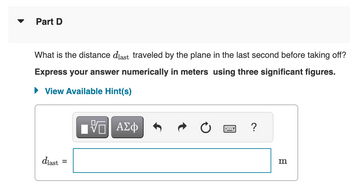To take off from the ground, an airplane must reach a sufficiently high speed. The velocity required for the takeoff, the takeoff velocity, depends on several factors, including the weight of the aircraft and the wind velocity. ▾ Part A A plane accelerates from rest at a constant rate of 5.00 m/s² along a runway that is 1800 m long. Assume that the plane reaches the required takeoff velocity at the end of the runway. What is the time tro needed to take off? Express your answer in seconds using three significant figures. ▸ View Available Hint(s) tro= Submit ▾ Part C 15. ΑΣΦ Part B Complete previous part(s) ■ dfirst C K A C What is the distance dfirst traveled by the plane in the first second of its run? Express your answer numerically in meters using three significant figures. ▸ View Available Hint(s) IVE| ΑΣΦ ? F S ? Revi m
Displacement, Velocity and Acceleration
In classical mechanics, kinematics deals with the motion of a particle. It deals only with the position, velocity, acceleration, and displacement of a particle. It has no concern about the source of motion.
Linear Displacement
The term "displacement" refers to when something shifts away from its original "location," and "linear" refers to a straight line. As a result, “Linear Displacement” can be described as the movement of an object in a straight line along a single axis, for example, from side to side or up and down. Non-contact sensors such as LVDTs and other linear location sensors can calculate linear displacement. Non-contact sensors such as LVDTs and other linear location sensors can calculate linear displacement. Linear displacement is usually measured in millimeters or inches and may be positive or negative.

Trending now
This is a popular solution!
Step by step
Solved in 3 steps with 2 images











